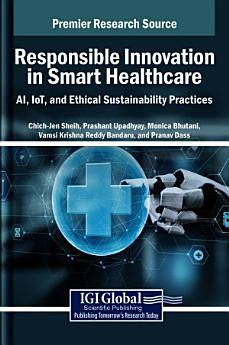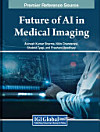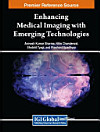Responsible Innovation in Smart Healthcare: AI, IoT, and Ethical Sustainability Practices: AI, IoT, and Ethical Sustainability Practices
About this ebook
Responsible Innovation in Smart Healthcare: AI, IoT, and Ethical Sustainability Practices explores the integration of AI and IoT in smart healthcare systems, focusing on how these technologies improve care delivery and patient outcomes. It explains the importance of responsible innovation by addressing ethical, social, and environmental considerations to ensure sustainable and equitable healthcare solutions. This book covers topics such as machine learning, ethics and law, and patient monitoring, and is a useful resource for medical professionals, computer engineers, academicians, researchers, and scientists.
About the author
Prashant Upadhyay is an Assistant Professor at, the Department of CSE, School of Engineering and Technology, Sharda University Greater Noida, Uttar Pradesh, India. He completed his Doctorate of Philosophy in Computer Science and Engineering, Gautam Buddha University. He has more than 07 years of teaching and research experience. He published several research papers in internationally reputed journals indexed in Web of Science, SCOPUS & SCIE and top-rank conferences as author or co-author. His research findings are published in Archives of Computational Methods in Engineering Springer, Computers and Electrical Engineering Elsevier, IGI Global USA, IEEE Xplore, Taylor and Francis. He served as a TPC and reviewer in Various International Conferences. He has edited 11 books with various publishers, including IGI Global, Bentham Science, and CRC Press, among others. He served as session chair in several international conferences- NGISE-2025, ICDT-2024, ICDETGT-2023, and ICDT-2023. He has authored a book for Wiley Publication- Introduction to Python, ISBN: 978-93-5746-219-8 and currently he is working on the book titled “Data Science in Business Analytics”. He has published 8 Indian patents and holds 2 grants.
Monica Bhutani is currently working as an Associate Professor in Bharati Vidyapeeth's College of Engineering New Delhi.
Pranav Dass is currently working as an Assistant Professor in the Department of Computer Science, Shyam Lal College, University of Delhi. He is also currently Visiting Professor at Shinawatra University, Bangkok, Thailand. He has served as Professor and Head of the Department of Computer Science and Engineering and also in-charge of Higher Study Cell in Bharati Vidyapeeth’s College of Engineering, New Delhi and has bagged several prestigious awards in his illustrious career which includes multiple Young Researcher National Science Foundation (NSF) Awards worth US $500 at several International conferences organized by University of North Carolina at Greensboro, USA. Besides these, he has been a pioneer research team member of Network for Non-Profit and Social Impact (NNSI) project titled Collaborative Research: Mind mapping consumers and activists’ response to NGO-corporate partnerships and Brand Associative Network Diagrams (BrANDi) fully funded by NSF Grant from October 2014 till July 2015. Additionally, Dr. Dass’ research paper Difference Equations and RaoHamming Bound had been awarded the Best paper award in the pre-doctoral student category at an International conference held at University of Southern Maine, Portland, USA in 2003; he also received a certificate, plaque and a cheque worth US $100 for the same. Dr. Dass had his college education from North Dakota State University, North Dakota, USA from where he earned his Ph.D. degree in Computer Science in 2017. Before this, he earned a Master’s degree in Computer Science from the same University in 2009. Talking about his academic accolades, he has published several international conference and journal articles. He has provided research guidance to students at both UG and PG levels including 5 Master’s students and 8 Bachelor’s students. Dr. Dass has delivered honor speech and served as session chair at international conference in South Korea. He is currently the Associate Editor of 2 SCOPUS journals and lifetime member of Computer Society of India (CSI). [Editor]






